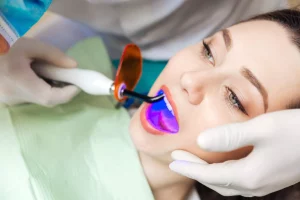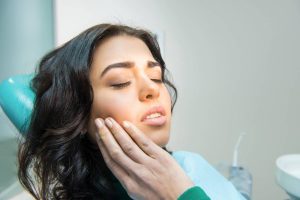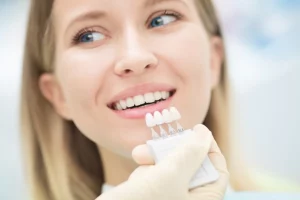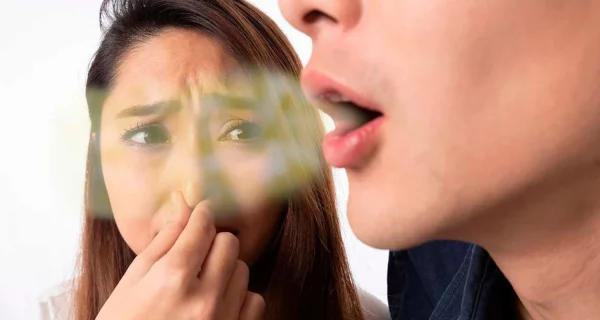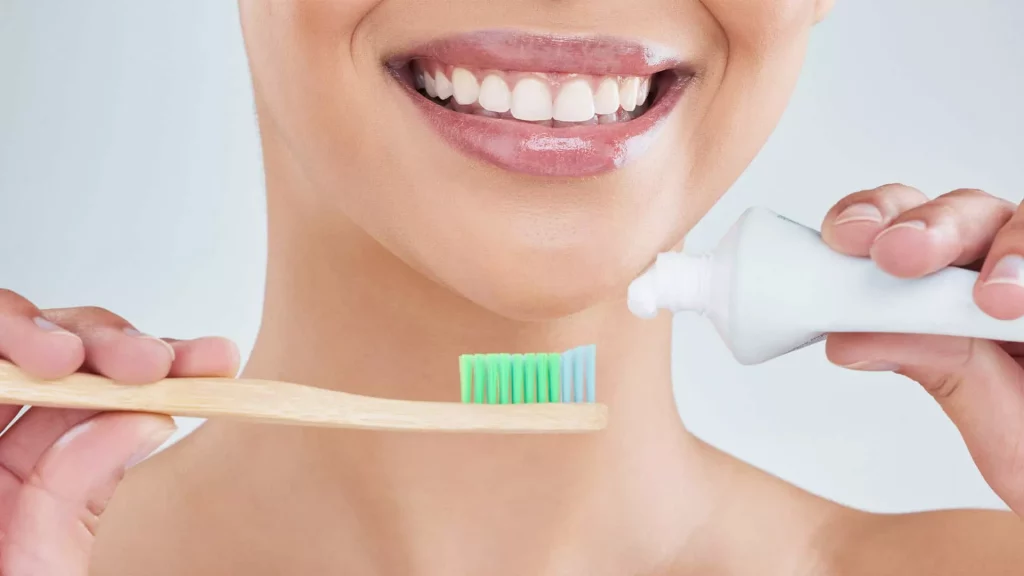Last Updated on: 14th November 2025, 08:17 am
Even brushing your teeth can feel impossible when your hands won’t stop shaking.
Tremors are one of the most recognizable symptoms of Parkinson’s disease. They often begin subtly—maybe just a slight shaking in the fingers—but over time, they can interfere with the simplest daily tasks. Oral hygiene is one of the first things to suffer. Brushing, flossing, and even holding a toothbrush become frustrating challenges.
This article focuses on how Parkinson’s tremors impact oral health and what you can do to maintain a strong, healthy smile despite the challenges.
How parkinson tremor affects oral health

Tremors can make brushing your teeth harder, along with keeping your gums healthy and feeling confident in your smile. Here’s how those small shakes can impact your mouth.
When brushing becomes a battle
Tremors can turn brushing and flossing into a real challenge. What used to take two minutes might now feel exhausting or frustrating. Shaky hands make it easy to miss spots, and flossing can feel nearly impossible.
The result is more plaque and a greater risk of cavities and gum disease. It’s not about doing it wrong, it’s just that Parkinson’s makes these everyday routines harder.
The risk of gum disease
When plaque builds up, gums can get red, swollen, and bleed. That’s the start of gum disease, and if not treated, it can lead to tooth loss.
Parkinson’s makes it harder to clean your mouth properly, so gum issues may appear faster than you think.
Dry mouth and its consequences

Many people with Parkinson’s also deal with dry mouth, often caused by medications. And it’s not just uncomfortable; it can lead to bad breath, cavities, and oral infections.
Saliva plays an important role in protecting your teeth, so when there isn’t enough of it, your mouth becomes more vulnerable to problems. Combine that with the difficulty of brushing and flossing properly due to tremors, and it creates the perfect storm for oral health issues.
Why regular dental visits are essential
For people with Parkinson’s, regular dental care is key. It helps catch problems early, supports daily hygiene, and provides treatments tailored to their needs.
Professional care makes a difference
For people with Parkinson’s, prevention is everything. Regular dental visits offer several key benefits:
- Early detection of oral health issues, such as cavities, gum disease, and infections, especially those made worse by tremors or dry mouth.
- Faster, more effective treatment, which helps prevent minor problems from becoming serious complications.
- Professional cleanings to remove plaque and tartar that are difficult to reach during daily brushing and flossing routines.
These visits are more than just a formality; they’re a vital part of protecting long-term oral health. It’s recommended to schedule check-ups every 3 to 6 months, so the dentist can detect issues early, provide treatment, and offer helpful care tips tailored to those living with Parkinson’s tremors.
Some dental offices now offer customized care plans for people with Parkinson’s, making each visit more comfortable and better suited to their individual needs.
Personalized treatments for parkinson’s patients
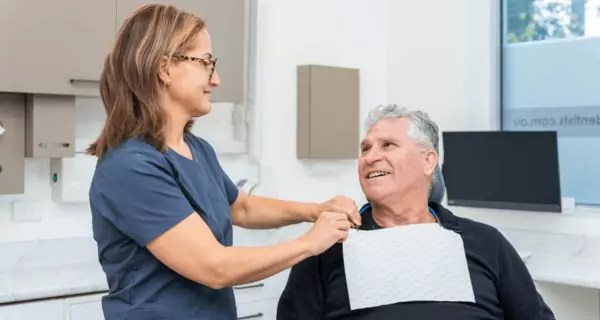
Dental care for people with Parkinson’s should never be one-size-fits-all. Everyone experiences different symptoms and challenges, so a personalized treatment plan is key to maintaining oral health.
Some common dental treatments can make a real difference:
- More frequent professional cleanings: Because at-home oral hygiene can be difficult, visiting the dentist more often for cleanings helps remove the plaque and tartar buildup that’s easy to miss during daily brushing.
- Fluoride treatments: Fluoride helps strengthen tooth enamel and reduce the risk of cavities. It can be applied in the dental office or used at home through special toothpastes or rinses.
- Dental sealants: Sealants are thin protective coatings placed on the chewing surfaces of the back teeth. They prevent food and bacteria from getting trapped, especially helpful for people who have trouble brushing thoroughly.
- Treatments for dry mouth: If medications cause dry mouth, dentists may recommend moisturizing gels, mouth rinses, or artificial saliva to keep the mouth comfortable and protect against decay.
- Comfortable, well-fitted dentures: For those who wear dentures, Parkinson’s symptoms can make them harder to manage. A dentist can adjust the fit or recommend alternatives that are easier and more stable.
Regular check-ups also allow for continuous monitoring, which is vital for managing the progressive effects Parkinson’s can have on the mouth. In certain cases, orthodontic treatments may be recommended to correct bite or alignment issues caused by tremors or other physical limitations.
Tools and solutions that make life easier
In addition to in-office treatments, dentists can recommend and even demonstrate how to use helpful at-home tools that will make daily oral hygiene more manageable. For example:
- Electric toothbrushes with larger, easy-to-grip handles and soft bristles help reduce gum irritation, especially if you tend to brush a bit harder due to tremors.
- Water flossers or pre-threaded floss picks can make cleaning between teeth more manageable.
- Even angled mirrors or seated brushing stations can help if you have trouble bending or standing for long periods.
These small adaptations can have a big impact on maintaining oral hygiene despite mobility challenges. When combined with regular dental care, they ensure that people with Parkinson’s can maintain a clean and healthy smile with confidence.
Other parkinson related oral health challenges

Living with Parkinson’s doesn’t just mean dealing with tremors; several other factors can affect oral health as well. For example, medications and mobility issues because these challenges require special attention and support.
How medications affect oral health
Medications used to manage Parkinson’s symptoms are known to have several side effects that impact oral health, such as:
- Dry mouth, which increases the risk of cavities, gum disease, and oral infections.
- Reduced sense of taste, making oral care feel less rewarding or motivating.
- Involuntary movements, which make brushing and flossing more challenging.
That’s why regular dental check-ups are so important; they help monitor these side effects early and prevent them from becoming serious problems.
Mobility challenges and oral hygiene
Beyond tremors, many people with Parkinson’s may also experience muscle stiffness, fatigue, and limited mobility. These symptoms make basic tasks like holding a toothbrush, bending over the sink, or sitting for long periods uncomfortable or painful.
Dentists may recommend adapting the oral care routine or using tools that make brushing and flossing easier, helping patients maintain better hygiene despite their physical limitations.
The importance of a support system

Dentists are essential, but caregivers and family members play a huge role in supporting oral health. Simple actions—like reminding someone to brush, helping them hold a toothbrush, or booking dental visits—can make a big difference.
A healthy mouth reduces pain, helps with eating, improves speech, and boosts confidence. Dentists also offer tips to caregivers on how to assist with brushing or how to modify daily routines to make them easier for everyone involved.
Conclusion
Tremors caused by Parkinson’s can make oral hygiene difficult, and the disease itself can lead to issues like dry mouth, cavities, and gum disease. But regular dental care makes a big difference.
If you or a loved one is living with Parkinson’s, don’t overlook oral health. A clean, healthy mouth supports comfort, nutrition, confidence, and quality of life.
Dentists are there to help by spotting problems early, adapting care to your needs, and keeping your smile strong at every stage.
So don’t wait for pain to make the first move; schedule that dental visit today. A little care today means a healthier smile tomorrow.
Frequently Asked Questions (FAQ)
References
1. Auffret, M., Meuric, V., Boyer, E., Bonnaure-Mallet, M., & Vérin, M. (2021). Oral Health Disorders in Parkinson’s Disease: More than Meets the Eye. Journal of Parkinson’s Disease, 11(4), 1507–1535. https://journals.sagepub.com/doi/full/10.3233/JPD-212605
2. Martimbianco, A. L. C., Prosdocimi, F. C., Anauate-Netto, C., Santos, E. M. D., Mendes, G. D., & Fragoso, Y. D. (2021). Evidence-Based Recommendations for the Oral Health of Patients with Parkinson’s Disease. Neurology and Therapy, 10(1), 391–400. https://doi.org/10.1007/s40120-021-00237-4
3. Dental Health in PD. (s. f.). Parkinson’s Foundation. https://www.parkinson.org/library/fact-sheets/dental-health
4. Tebbutt, J. E., Marshman, Z., & Baker, S. R. (2024). Oral health experiences of people living with Parkinson’s disease: a scoping review. BDJ. https://doi.org/10.1038/s41415-024-7058-8
5. Verhoeff, M. C., Eikenboom, D., Koutris, M., De Vries, R., Berendse, H. W., Van Dijk, K. D., & Lobbezoo, F. (2023). Parkinson’s disease and oral health: A systematic review. Archives of Oral Biology, 151, 105712. https://doi.org/10.1016/j.archoralbio.2023.105712







